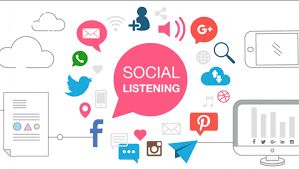Communication makes the world go round including the world of digital marketing. Every organisation seeks to communicate with their audience in a way that they understand and communications professionals are required to steer those conversations in the right direction. However, this goes beyond just driving your brand’s messages through various campaigns. You have to listen to your audience so you can understand what they want and how you can help them.
Data is the backbone behind making informed decisions. Armed with the right data set, you are able to determine where you should channel your marketing efforts, understand the behaviour of your target audience and mitigate any possible risks that could arise in the course of running your online and offline campaigns. To achieve this, you have to pay attention to what your audience is saying and this is where Social Listening comes in.
What Is Social Listening?
Social Listening is a process that involves gaining insights by keeping track of various social media platforms for conversations that mention or are concerned with your brand which would enable you to effectively plan subsequent social media campaigns.
With social listening, you are not working based on assumption but on concrete information that you’ve gathered. Millions of people use social media platforms and air their views on a wide range of issues including their experience with using certain products. Listening to what they say would make it easier for you to modify or improve your products and services thereby giving your audience a good brand experience.
Social Listening vs Social Monitoring
Social monitoring is also a concept that helps you keep track of online conversations about your brand. It has to do with monitoring what is being said about your brand and responding to these messages where necessary. Social listening on the other hand helps you understand these messages and act accordingly.
While social monitoring has to do with narrowing down to specific keywords and messages, social listening is a broader and all-encompassing search on customers’ feedback, industry and market trends and so on.
Social monitoring tells you what people are saying, social listening helps you understand why people are saying what they are saying. Both concepts are important in getting feedback from your audience and help in providing better products and services to your customers.

Why Is Social Listening Important?
In the world of digital marketing, your target audience is one of the critical factors around which you direct your marketing strategies and campaigns. Social listening helps you to understand your target audience, the kind of content they respond positively to and the channels you should place more focus on. Social listening also helps you;
- Establish Brand Loyalty
No one wants to talk without being heard. It’s even better when it feels like your thoughts can be read and acted on. When you conduct social listening and act on the information you have collected, customers feel heard and this is known to be key in fostering brand loyalty.
- Acquire New Customers
Referrals come easy when your customers are satisfied with the products or services that you offer. By receiving and acting on customer feedback, you establish brand loyalty and make it easier for them to refer your brand to their families, friends or even colleagues.
- Gain Insights into Your Competition
Aside from listening to what people online are saying about your brand, you also learn what people are saying about your competitors. This will keep you steps ahead of the game by solving the issues competitors might have through your product or service.
- Develop Your Products
Getting exclusive information about your customers’ preferences will enable make enhancements to your products where necessary. It could be new features, refining existing ones or coming up with something different entirely.
- Avert or Manage
Social Listening can help you to decipher when there is a rise in negative comments or feedback early enough to douse a brewing storm. You can avert a looming crisis or effectively manage one that’s already upon you when you are equipped with the right information.
- Establish Connections
Discovering who the thought leaders and influencers in your industry are can help you form valuable collaborations with them that would be of benefit to your business and the influencer.

How to Conduct Social Listening
While you may battle the temptation of trying to conduct social listening on every platform and on every possible issue that has to do with your brand or industry at large, it is more effective to work according to the goals and objectives of your search.
- Set Your Goals and Objectives
You have to first understand what you’re trying to achieve by the research you’re about to conduct. Your objectives could range from trying to introduce a new product into the market and learning what customers are currently saying, to observing what people are saying about your competitors or even the trending issues in your industry.
- Decide on Key Words and Phrases To Listen For
You need to have a list of keywords and phrases that are aligned with your brand, your competition or your industry, as the case may be. This will help you to streamline your social listening process and define your results.
- Set a Timeline and Choose the Platforms
You have to decide the timeline within which you want to conduct your social listening search. Determine how far back you would search for comments and related online conversations. You also need to decide on the platforms you want to conduct your social listening on.
- Decide on the Social Listening Tool To Use
There are different social listening tools that you can use to understand your audience. These tools have their pros and cons so you have to decide which one best matches the goals you have set for the process.
- Establish a Result Collection Process
You need to decide on the platform on which your results can be analyzed and measured in order to determine the next steps to take. Understanding your results will help you to figure out where you need to make changes.
Social listening is a concept every organisation that intends to stand out should embrace. Industry and customer trends are constantly changing in our fast-paced world. It is important that your brand is up-to-date with these changes and comes up with innovative ideas to maintain relevance in its industry.





